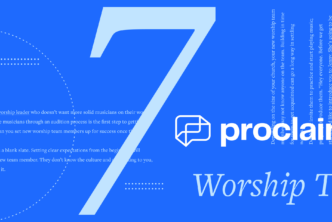Four lines, thirty seconds long, and yet one of the most popular worship songs for centuries.
How has “Doxology”—officially called “Praise God, from Whom All Blessings Flow,” but usually referred to as The Doxology (as if there were no other)—become such a fixture of Christian worship? (For example, it’s been one of the top-10 songs appearing in Proclaim for the last 46 weeks.)
About “Doxology”
Although the word doxology is not found in the Bible, its meaning is highly biblical. Doxa- means “glory,” and the suffix -ology means “study of” or “word.” Thus, doxology is a word about, or meditation upon, God’s glory. And it usually takes the form of a hymn.
In the Doxology, we praise God for His blessings (Eph. 1:3), glorify Him as Creator (Ps. 150), and affirm the Trinity (Matt. 28:19). These things have long been integral parts of true Christian worship.
About the melody
The melody comes from the 1551 Genevan Psalter (supervised by John Calvin) and is attributed to Loys “Louis” Bourgeois. Bourgeois wrote new melodies and also adapted melodies from existing sacred and secular sources.
At the time the Genevan Psalter was released, the Church, for the most part, was not singing together congregationally. Only the clergy would sing in worship services. This psalter was released to spur on the corporate singing of churches in their own languages, for reasons John Calvin explains well:
It is a thing most expedient for the edification of the church to sing some psalms in the form of public prayers by which one prays to God or sings his praises so that the hearts of all may be roused and stimulated to make similar praises and thanks to God with a common love.
The Genevan Psalter, and the Doxology’s melody specifically (which came a century before the lyrics), were catalysts for corporate musical worship as we know it today.
About the lyrics
The lyrics of the Doxology were penned in 1674 by Anglican bishop Thomas Ken (1637–1711), and were published in a book of prayers for Winchester College students, where he served as chaplain. The lyrics actually formed the closing stanzas of three different hymns: “Awake, My Soul, and with the Sun,” “All Praise to Thee, My God, This Night,” and “My God, I Now from Sleep Awake.”
However, at some point over the years, God’s people naturally gravitated toward that stanza and sang it on its own, giving rise to what we today recognize as the Doxology. It is sung in countless languages throughout the entire world and has been recorded by numerous artists.
Why sing the Doxology for Easter
Singing the Doxology together as a Church body is a helpful way of gathering around our confession of the Trinity, our generous God, and His kingship over all the world.
And it’s especially fitting for Easter. In America, at least, Easter is wonderfully timed with the return of spring so that even creation seems to be proclaiming new life. The trees dress themselves in green, flowers bloom, and daylight lasts longer.
And two Sundays from now, God’s people will gather to join in, proclaiming the new life they have—and that all creation has—in the resurrection. We live now in the very time Scripture mentions when it says, “For we know that the whole creation has been groaning together in the pains of childbirth until now” (Rom. 8:22).
Until now.
On Easter Sunday we proclaim the “now”-ness of new life. God’s people singing inside, and creation singing outside, join the angel who first declared it at the empty tomb: “He (Christ) is not here; he is risen.”
And all God’s people say, “He is risen, indeed!”
Lyrics
Praise God, from whom all blessings flow
Praise Him, all creatures here below
Praise Him above, ye heavenly hosts
Praise Father, Son, and Holy Ghost
Amen!
This guest post is brought to you by Faithlife Proclaim—presentation software made just for churches. Start a free trial today.




